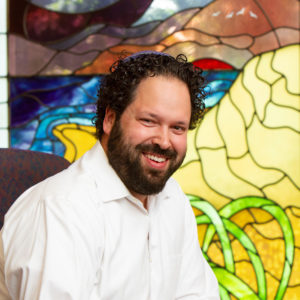Commentary on Parshat Sh’lach-Lecha (Numbers 13:1 – 15:41)
Today, the entire country is aware of the conditions in which immigrants—including children—are being held at the southern border. But when word first began to get out—in Tornillo, Texas, and in Homestead, Fla., and in other places even before those—how did the rest of us hear about it? We are in debt to a variety of scouts, people on the ground who saw firsthand what was happening and raised the alarm. Average citizens who were concerned about the treatment of children at the hands of our government. Ordinary citizens who want to share their reports with the world. These scouts are unambiguous in what they see and what they hope we all will do. Will we hear them?
There are two parallel moments in this week’s Torah portion, Sh’lach. As the scouts return from having scouted the land, they share what they learned with Moses, Aaron, and the entire Israelite community. They say, “We came to the land you sent us to; it does indeed flow with milk and honey, and this is its fruit.” Without knowing anything more, this could have been a moment for celebration, but of course, the scouts continue, saying, “However, the people who inhabit the country are powerful, and the cities are fortified and very large; moreover, we saw the Anakites there.” With those words, we can almost anticipate the next letdown. After Caleb tries unsuccessfully to rally the people, the scouts continue, “We cannot attack that people, for it is stronger than we.” God’s promise seems destroyed, the Israelite endeavor now wholly in question. The scouts’ turn of phrasing comes with one little word often translated as “however.” The word in Hebrew is efes, and it means end, cessation, or in our verse in question, something like “it is all for naught.”
Sign up to receive Torah from T’ruah in your inbox each week.
The parallel moment comes in Numbers 14:21. After God threatens to destroy all of the Israelites (save Moses), Moses is able to convince God not to. Many of us may be familiar with the verse just before verse 21 from the High Holiday liturgy; we read in verses 19-20, “Pardon, I pray, the iniquity of this people according to Your great kindness, as You have forgiven this people ever since Egypt. And YHVH said, “I pardon, as you have asked.” That could have been the end of the narrative. However, much like the scouts could have stopped after reporting on how lovely the land, God continues, saying, “Nevertheless, as I live and as YHVH’s Presence fills the whole world, none of the men who have seen My Presence and the signs that I have performed in Egypt…shall see the land that I promised on oath to their fathers…” Again, the turn of phrase offered by God comes with an odd word choice, translated above as “nevertheless.” The Hebrew word is “ulam,” appearing only three other times in the Torah.
With one word, one slide from the initial intention, everything changes.
Whether it is Ulam or Efes, we all have moments like this. Moments when we have a sense of the right path, the just path, and we veer off. With so much happening in our world, it is all too easy to pivot with just one word, only one thought, losing sight of what could have been. What is our Ulam or Efes that has prevented us from entering the holy land of witness and protest?
Find more commentaries on Parshat Sh’lach-Lecha
T’ruah, along with other ally organizations, ventured down to Homestead last week to witness and protest the detention camp housing 3,000 unaccompanied minors who crossed our southern border. Last week, RAICES engaged in guerilla art on the streets of NYC, setting up small cages with mannequins inside, depicting the way our government is treating children from Central America today. Homestead is currently the only emergency influx detention center, a designation that enables the government to circumvent regulations limiting how long children can be detained. But the government is building more.
 It is fantastic that Jewish organizations such as T’ruah, Bend the Arc, and the RAC are taking a leading role in the fight against immigration injustice. But in some ways, these organizations are only scouts for us. With over 13,000 children in custody, and thousands of those children being held in influx shelters that do not have to abide by the standards implemented in permanent shelters, we don’t just need scouts; we need legions of witnesses and battalions of protesters. Could there be a more Jewish issue than standing up for imprisoned migrant children who have committed no crime? We must not look away; we must not fear; we must not give into our Ulam. We must show up. Please God, we all won’t spend the next 40 years wandering in the wilderness wishing we had acted in another way.
It is fantastic that Jewish organizations such as T’ruah, Bend the Arc, and the RAC are taking a leading role in the fight against immigration injustice. But in some ways, these organizations are only scouts for us. With over 13,000 children in custody, and thousands of those children being held in influx shelters that do not have to abide by the standards implemented in permanent shelters, we don’t just need scouts; we need legions of witnesses and battalions of protesters. Could there be a more Jewish issue than standing up for imprisoned migrant children who have committed no crime? We must not look away; we must not fear; we must not give into our Ulam. We must show up. Please God, we all won’t spend the next 40 years wandering in the wilderness wishing we had acted in another way.
Rabbi Josh Whinston is the spiritual leader of Temple Beth Emeth in Ann Arbor, Michigan. Rabbi Whinston is passionate about immigration issues and works with the local interfaith community supporting the sanctuary movement and asylum-seeking families.

